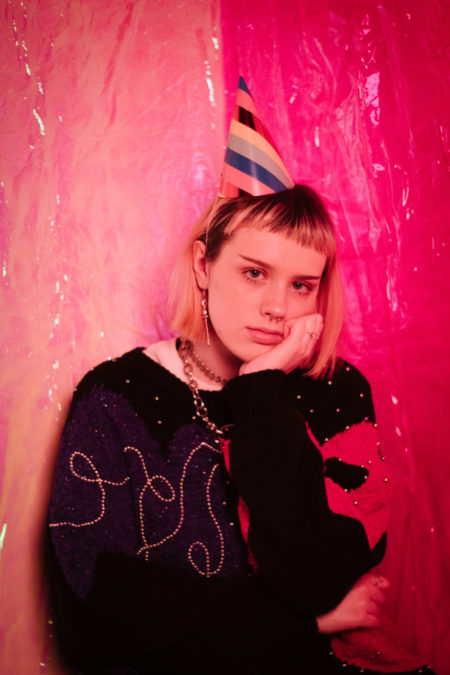“I’ve gotten tons of DMs being like, ‘I came out because you inspired me to, you made me realize that I was actually nonbinary, this song is made for me and my girlfriend.’

As email after email came through their inbox, Frances Garnett couldn’t help but cry. The months of quarantine up to that point had consisted of Animal Crossing and writing the music for their friend’s thesis film Cranberry, but not much personal songwriting for themself. As dozens of record labels began reaching out to them, though, they realized that this could be their career changing moment.
“It was a whirlwind. It all happened within a couple weeks… my finals were due, and I was like, ‘I can’t focus on anything!’” Garnett, 21, said. “I emailed my professors and I was like, ‘Help!’ It was really crazy.”
Just as the seasons were changing and school was starting up again, “Space Girl,” the song dubbed favorite by all the panelists for WBUR’s 2019 Massachusetts Tiny Desk competition, went TikTok viral—as in, 500,000+ views viral. Back when it won favor at Tiny Desk, Garnett had about 15,000 streams on Spotify. Now, the song itself has over 31 million.
Garnett, known to fans as Frances Forever, specializes in the art of bedroom pop. Low-fi and contemplative, their music is soft and upbeat all at once. Fans of alternative or indie music might recognize the stage name—“Francis Forever,” a song by Mitski. That was actually the inspiration for it; originally, the name was meant for their college cover band, but Garnett took it over when those plans fell through.
“I’ve always loved Mitski’s song-writing,” Garnett said. “She’s made music that I’ve never heard before, her melodic lines are incredible, and I’m really inspired by her.”
Even before quarantine, TikTok dances were one way that people go viral on the app. Easy, fun parties for people to copy and share, and in early fall, “Space Girl” was next up. The dance, created by Garnett’s partner Robin (known by the username @papa.squash), was an upbeat, happy tune, and it soon spread across all corners of TikTok. Those who participated sported crazy outfits, glittery makeup, and bright-colored hair—mostly, it was about self expression, a celebration of the femme. Before long, it had millions of videos attached to it, and Garnett’s Spotify listens topped two million.
“I made a cake with my partner, and we just had a little celebration on our own,” they told the Dig. “What’s really interesting about something like this happening during quarantine is that I haven’t left my apartment in so long, and I haven’t been able to actually see everyone who’s been listening to my stuff. … It’s so hard to get a feel that this many people have listened to my music or my song, and I don’t think that’s really going to set in until I tour and I see them all in a room.”
During the first stage of the COVID-19 quarantine, TikTok took on an entirely new role in the world of social media. Without live performances, many up-and-coming artists used the platform as a means of growing their fanbases. Previously unknown artists were suddenly getting global fame and getting signed to labels, like Ant K Saunders with his song “Yellow Hearts” and Lil Nas X with “Old Town Road.” Before, it was almost unheard of for unsigned artists to garner such fame unless they were discovered on a show like “The Voice”; now, it’s possible for artists to make a name for themselves all on their own. Garnett is proof.
“A really surreal moment was when Ashley Tisdale did the ‘Space Girl’ dance,” they said. “I’ve had a sticker of her on my bed since I was so little, and I can’t even imagine that that’s me that she’s listening to.”
Some people describe seeing the “Space Girl” on their “For You” page, as an indicator they’re on the right side of TikTok. The “right side of TikTok’” is a commonly used phrase describing the idea that users of TikTok have algorithm-curated pages that fall in line with their personalities. Common sides of TikTok are ‘theatre-Tok’ and ‘witch-Tok,’ but also ‘straight TikTok’ and ‘gay TikTok.’ These sides are not so much to do with the physical identity of the creators/viewers, but more to do with the perceived energy of the content being watched. When saying you are on the “right side of TikTok,” this simply means the algorithm has correctly curated videos that align with your personality. “Space Girl,” for example, was most commonly found on more alternative sides of the app, and the dance recreated by many of those in the LGBTQIA+ community.
“I always kinda wanted it to be a ‘gay anthem’” Garnett said. “I’ve gotten tons of DMs being like, ‘I came out because you inspired me to, you made me realize that I was actually nonbinary, this song is made for me and my girlfriend.’ I didn’t know that it would speak to so many people, and that’s … exactly where I wanted my music to go.”
On Jan. 29, 2021, four months after their song went viral, Garnett released a new version of “Space Girl” in collaboration with fellow bedroom-pop artist Chloe Moriondo. The new version is accompanied by new merch, as well as a lyric video, and a recently released music video for the original version of the song (which, according to Garnett, teases a future project in the works).
As millions of people around the world now realize, as fans in New England have for a few years, Frances Forever’s high-energy, fuzzy beats could bring anyone out of the quarantine blues. “Space Girl” is a beacon of light in times of darkness and uncertainty, reminding listeners that every person can be their own lover and their own muse. Though TikTok fame is often temporary, it’s easy to imagine Garnett’s star is on the rise.
“It’s become bigger than just me,” they said. “I wrote the song before I came out as non-binary, and at the end it says, ‘space girl and Earth girl.’ I thought about changing it, and then I was like, ‘You know what? This isn’t about me anymore. This is about everyone who relates to it, and I think that’s really beautiful.”
francesforever.com
Lizzie Heintz is a photographer and journalist based in Boston, MA, originally from London, UK but more recently Houston, TX. Outside of DigBoston, she also has written for The Somerville Times, her student newspaper The Berkeley Beacon, and has been licensed by VICE. While her writing mostly focuses on entertainment, her photography covers social justice, politics, and breaking news, as well as independent long form documentary work.

